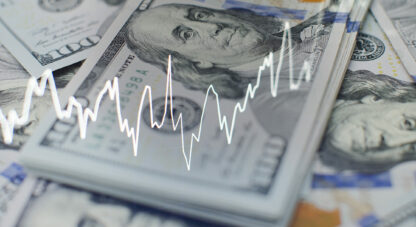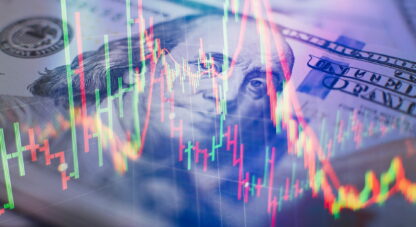The McAlvany Weekly Commentary
with David McAlvany and Kevin Orrick
“What has happened is, your money is not buying what it used to. It is not worth what it used to be. And if this piece of history is forgotten, as Jim Deeds suggested last week, this is the history which you will relive on an even more exaggerated basis, when you forget that money and a real asset, have to, or should be, tied together. If that is not the case, then all kinds of bad things happen.”
– David McAlvany
Kevin: “I killed the bank.” That’s what reads on Andrew Jackson’s gravestone, not that he was the seventh President of the United States, not that he was part of a very young revolutionary country, but I killed the bank – pretty significant.
David: If you consider what the challenge was, this is the second central bank of America and the first charter was allowed to expire under the suspicion of corruption.
Kevin: Oh, not with the central bank – corruption?
David: Oh, yes, absolutely – playing favorites with a select few within the economy, and so politically it was impossible for them to continue. The second central bank got launched, and of course, Andrew Jackson was the man who fought that. So, it’s interesting that we have Jackson versus Hamilton, the 10-dollar bill versus the 20-dollar bill. The central bankers’ greatest enemy, Andrew Jackson, got the push. A little ironic that he was even on a bill to begin with (laughs) given his history with central banks. But the battle for Hamilton is won and the conclusion is that the first Treasury Secretary of the United States is more important than the seventh president.
Kevin: Let’s put that in perspective for a second. We’ve had, currently, Alan Greenspan, a man who was very much for the gold standard, and was very suspicious of central banking in the 1960s. He was good friends with Ayn Rand, and he believed in almost a libertarian mindset, free marketism and strong money, yet he became probably the most abusive central banker of the 20th century afterward.
Let’s go back to the Revolutionary War. Alexander Hamilton was a man who had convinced George Washington to start the very thing that they had just finished fighting against, a central bank. They had fought against the Bank of England and won, and then he said, “Let’s start our own.”
David: Right. Honestly, I have no comment on Harriet Tubman other than that recognition and respect are due. That’s obvious. But my issue is with the alternative bills which were considered, the 10 versus the 20. Choosing the 20 wipes out an important part of our history. Jackson did away with the second central bank of America in 1833 after determining that the national interest was not being served well, and that, frankly, only the interest of a thin slice of businessmen and industrialists was being catered to. So, the first bank, as you said, was founded by George Washington at the direction of Alexander Hamilton in 1791. And Hamilton was in love (laughs). Hamilton was in love with the Old Lady of Threadneedle Street. That is the name that is given to the Bank of England, because the Bank of England is sitting on Threadneedle Street in downtown London.
Kevin: Didn’t he grow up in an English protectorate? He had a background of being around the royalty in control of England.
David: Yes, he was born in a British colony, grew up on the island of Nevis, and Hamilton’s sympathies were decidedly old world in the new nation. He liked the idea of centralized decision-making and control. Contrast that with Jackson, who was more attuned to the growth of the nation and its push westward. Obviously, that’s where some of his mistakes were made, how he did that. Clearly, there are some decisions that he made which can’t be excused, but his push westward was saying, “Look, we can’t play favorites with the industrial elites in the northeast. And it was clear that he did not like the strange economic and political power that the second central bank of the United States wielded. And at that time there was no congressional oversight, either. So, it seems to me, here in 2016, that the system organizers are tidying up the historical narrative on central banks, and the reality is, it is convenient that he drops off the twenty, and we erase that part of history which says that yes, there is a tendency when you are talking about central banks toward corruption and playing favorites within the economy.
Kevin: It says in the second Psalm, “Why do the kings conspire?” And that is what we have seen all through history, conspiracy from the top. Let’s face it, we’re going to keep the 10-dollar bill with Hamilton on it, we’re going to have Harriet Tubman on the 20-dollar bill, and as you said, it is perfectly worthwhile that she get recognition somehow, it is just interesting that Jackson is no longer part of the memory of America.
David: Maybe my ire on this is misplaced, because Jackson would be only too happy to be replaced. He would say, “I don’t want to be on a Federal Reserve note to begin with. What were you thinking?” But what I don’t like is this soft form of historical revisionism where all of a sudden some of the last evidence that central banks and corruption go hand in hand is being tidied up.
Kevin: Let’s go ahead and move to the stock market, because thanks to the central bank of America, which is the third, isn’t it interesting? I think about American history and how central banking has almost been abolished over and over, but like a bad penny it continues to show up. But once they are in control, they can’t just control their control. The stock market has been controlled by our central bank at least since 2008, since the financial crisis. At this point, we’re seeing industrial production falling; we’re seeing retail sales falling. We’re showing all the signs of a contracting economy, yet our stock market at this point, Dave, is being fueled by somebody.
David: This is where, certainly, economists choose the data that they are interested in, and the data that they want to ignore. So as the history books will record, 2016 and 2017, there were no signals that the economy was sputtering and in trouble. That’s what the economists will say, “We could not have seen anything changing,” and yet, as you mentioned, industrial production for February was revised lower. In March it was down 0.6% year-on-year, and that decline, if you’re looking at a year-to-date decline, down negative 2%. So we are now at levels which are only seen, in terms of industrial production, in a recession.
Kevin: Yet, the stocks rallied during that same quarter.
David: Sure. So in the first quarter you have industrial production which has declined, stock prices have rallied in spite of that, back into positive territory. You have retail sales also declining in the first quarter as stocks have strengthened. And it is not a healthy disconnect to see some of the organs of the economy failing and to claim that the body is still in good health.
Kevin: Let’s look at the blue of the blue – IBM.
David: Chart of IBM, you have revenues which are in decline, but you look at the stock price and it is actually holding up well, relative to its decline in earnings. So in light of this equity rally, if you’re feeling like you need to send a thank you card, send one to Mario Draghi, and maybe the crew over at the People’s Bank of China, because the liquidity is flowing and it is beginning to create that, “Oh, listen, all is well, all will be fine.”
But again, these are signals which economists choose, and prefer to ignore.
Kevin: There are three signals, Dave, that you have chosen to look at when you’re looking at the stock market. There is the margin debt on the stocks, which has been extremely high. There is the Q ratio, and we have talked to Smithers about that. But let’s just talk about the CAPE adjuster to the Shiller PE, the Price Earnings Ratio. That is something that most people know a little bit about, they realize that the Price Earnings Ratio, if is in a 14-to-1 range, the stock market is relatively healthy. If it is above 20, you’re getting ready for a crash. We’re well above 20 now, aren’t we?
David: Yes, and you mentioned CAPE. That stands for Cyclically Adjusted Price Earnings. We know it better as the Shiller PE, but what it is is a cyclically adjusted price earnings. It is a ten-year rolling average of the price earnings multiple and it is sitting at a very lofty 26.21 today. And I think as earnings continue to deteriorate and stock prices remain relatively high those numbers are factored in. And I guess we see a spike to about 30, and that will be it. Then the journey from over-valuation, where stocks are overpriced, is likely to begin in earnest toward under-valuation. At the same time we have the Buffet indicator, as documented last week by CNBC, which measures the S&P 500 relative to the GDP statistics, so you are talking about market cap divided by GDP, and it shows the S&P 500 is over-valued by about 72%.
Kevin: Which is substantial for the person who is looking at their retirement possibly moving down that much.
David: Again, in the theme of, what do you want to look at, and what story do you want to tell, we are in earnings season, this is a big week for earnings reports, and it is very interesting, when you look at the S&P 500, stocks which are reporting. The New York Times wrote this up recently, the difference between reporting GAAP earning versus non-GAAP earnings. What is GAAP? The Generally Accepted Accounting Principles versus non-GAAP, which allows for all extraordinary things to be factored in, but are outside the pale in terms of the generally accepted accounting principles. So as of 2009, 72% of companies preferred non-GAAP earnings.
Kevin: In other words, it is not generally accepted, but they can put that on the books.
David: That’s right. Now compare that to today, about 90% of S&P companies are going to non-GAAP, and here is why. Look at last year up to this year, non-GAAP net income. This is what companies prefer, was up 6.6% for 2015. Yes, of course they love it, it is up 6.6. But compare that to GAAP net income and those same companies are down 11%.
Kevin: Dave, as the owner of a company, if you used non-GAAP accounting, that is called cooking the books. If you tell everybody that you are making money, but in reality you are losing money, that’s just cooking the books.
David: The reason why they don’t consider this cooking the books for publicly traded companies is you follow the asterisk and the asterisk says, “We’re disclosing to you that these are non-GAAP numbers. Make of them what you will. We realize they are B.S. but you may not realize it because most people don’t read the asterisk (laughs).
Kevin: Have you seen this commercial? This is two competing companies for cell phone coverage. I love the commercial because it shows a map of the United States, by another company, and it says it looks like this is the extent of their cell phone coverage, but there is an asterisk at the bottom of the screen, and it says, “This does not represent the coverage of our cell phones.”
David: That’s hilarious.
Kevin: And it’s like, “Well, then, what are you really showing us?” And that is what the commercial brings out. It is a brilliant look at non-GAAP reporting. Let’s put it that way.
David: The New York Times article – the title of it caught my eye because it included fantasy math. “Welcome to Fantasy Math,” as the New York Times calls it. The way that companies are reporting their earnings, 90% of your S&P 500 companies are now reporting non-GAAP earnings which the New York Times very colorfully calls Fantasy Math, which is exactly what it is. It is how you turn a negative 11% to a positive 6.6% and tell the world, “All is well, thank you very much. Don’t ask questions. And read the asterisk if you need to have the proper disclosures.”
Kevin: Speaking of the kings conspiring, you have to watch Goldman-Sachs and what they are doing, not necessarily what they are saying. Goldman-Sachs is strangely cutting back during a period of time when they would like people to think that things are just fine.
David: Right. As you may recall, Rolling Stone refers to Goldman-Sachs as the Great Vampire Squid, and it appears that they are running out of blood subjects. They are cutting costs aggressively. But the curious point about that is that when the economy is very healthy, the financials, Goldman-Sachs being one of the financials, are usually making money hand-over-fist. And yet, Goldman-Sachs’ earnings are ugly. They are the lowest in more than four years, as reported last week.
Kevin: With a stock market that is hitting new highs.
David: And management is taking drastic actions which are usually reserved for a low ebb in the business cycle, where you start letting people go left and right. We have Citigroup’s earnings – they got goosed last week by reduction. That is, they were boosted higher by a reduction in loan loss reserves. It is a very popular accounting trick that gets earnings where you need them or where you want them to be. It was very telling as you watched Citigroup’s action last week, telling and unhealthy. The shares rallied on the earnings report. The success gave you a 3.5% gain, and then by the close of the day they were down.
Kevin: That’s pretty volatile.
David: So some investors do, in fact, read the asterisk, read the details, look and say, “Wait a minute, wait a minute. You mean the loan loss reserves are how they beat the number, or got to a decent number?” And the reality is, it is B.S. earnings. That’s what they are. Reuter’s last week – this was great – they looked at six of the biggest U.S. banks, again, speaking about the financials in general, Goldman-Sachs in particular, and their earnings, which were ugly. Reuter’s looked at the six biggest U.S. banks – J.P. Morgan, Bank of America, City Group, Goldman-Sachs, Morgan Stanley, Wells Fargo – and first quarter revenue was falling. It was in its steepest decline in five years. And collectively, these banks’ revenue, collectively, down 9% from a year earlier. Net income – of course, if revenue is down your net income is going to be down even more, revenues down 9% -- net income was off 24% year-on-year. So again, keep this in mind, when the economy is very healthy, the financials are making money hand-over-fist. What is happening that the financials are not doing well, and yet our barometer for all is well and the economy is doing well…
Kevin: Is the stock market.
David: I’m just saying, pay attention to the disconnects.
Kevin: Yes, but the guys who are actually trading and pushing stocks one direction or another are usually momentum traders. You look at the popular stocks called the FANGs.
David: Facebook, Amazon, Netflix, Google.
Kevin: Those are momentum. Those aren’t earnings-based.
David: No, but they have been disappointing on their earnings and they have been punished. They disappoint on their earnings, they are down 5-10% in a single day, and so a number of those are NASDAQ listed and that is where the weakness here recently has shown up is in what have been the most popular companies to own, by hedge funds, by individual investors. They are the “story stocks,” the companies that don’t have to justify having price earnings multiples, double-digit clearly, but 50, 100, even 1000 (laughs).
Kevin: But they are pulling back right now, for another surge in the future, or are we looking at possibly a downturn?
David: You have bad earnings on key companies, more economic data that suggests recession ahead, and yet stocks are rallying, oil is rallying. What it suggests to me is that you have a seasonal peak, that we are putting in a seasonal peak where trader’s are gaming for performance to the end of April, and it ends the November to April happy season in the stock market, and begins the May to November sad season, where usually your performance is negative in that timeframe. There is that element of seasonality.
There is also the idea that Draghi continues to deliver, currently over 90 billion dollars a month, less than that if you are counting it in euro terms, but that is what he is pumping into the system on a monthly basis. And June, actually, is the start date for the purchase of corporate bonds in Europe. So you are looking at these massive monetary policy injections – I mentioned Draghi earlier, and the PBoC, as well. The PBoC has had some major, major injections here in the last week or two, and not surprisingly, we are seeing a bump in commodities. Funny money goes into China, and it does go someplace, and apparently commodities are getting some benefit there.
But the central banks are acting like they have for years, basically, since Greenspan developed what became known as the Greenspan put, where if the market goes down central bankers step in, and you never really have to worry about long-term or catastrophic declines. The business cycle has been handled and controlled, and is being directed up, up, up and away.
Kevin: I think we should put into perspective that 90 billion U.S. dollars a month, if you convert it to euros. That’s what is being pumped into Europe right now. That is very similar to what we were pumping at the peak of our quantitative easing per month here. So all that happened was, the baton was shifted from America over to Europe, as far as QE.
David: That’s a key point. It’s almost like a rolling responsibility amongst the central bank community. “We can’t all pump at once, it mutes the effects. So I’ll pump now, I’ll take my turn, and our currency will take a hit. Of course, we get some benefit from that. But it’s not as if we’re trying for a long-term benefit. Look, we’re going to ease off, and now it’s your turn.”
Kevin: All right, well, a bad pun is coming, but let’s go ahead and talk about “cannot pump all at once,” okay?
David: (laughs)
Kevin: You have Saudi Arabia and Iran. Let’s talk about oil for a minute.
David: Sure. Well, that’s the conflict. It’s a political conflict and the Saudis are playing politics with oil. We did not comment on the Doha meeting last week, the OPEC meeting, actually, just over a week ago, because a conversation with Jim Deeds focused primarily on gold. But the media assumed, coming into the meeting, that we were going to see higher oil prices because an agreement was going to be made to cut production and the numbers were going to be in agreement on that. The Saudis weren’t willing to concede ground to Iran, and if Iran was going to freeze production then the Saudis would be on board and do the same. But Iran has refused, at least until they regain their presanction volumes.
So the Saudis have made this quasi-political decision to pump and not allow Iran’s oil ministry to fill a gap. They don’t want to leave one. The only place where you have seen an easing in production is because of what is happening, the feared decline rates here in the U.S. U.S. production has come off a little bit and traders have pushed contract prices higher in light of that. But I want to recall one thing, and this is a very, very important element. Storage capacity, globally, and here in the United States, is still at precariously high levels. And if we reach or exceed storage limits, the market will then know what a real glut on the market looks like and how it affects the price.
Kevin: Yes, that’s when you have tankers sitting out in the gulf that just can’t deliver oil because there is no place to put it.
David: Yes, and to some degree traders are also playing a seasonal game with oil and gasoline. So the rally in other commodities – moving away from oil – the rally in other commodities in recent weeks – your industrials come to mind, in particular – have a whiff of Chinese speculation. Just on an anecdotal basis, you have the contract for steel rebar which last Thursday had volumes just on one day that exceeded – this is Shanghai traded – volumes on one day that exceeded the entire capitalization of the Shanghai stock exchange.
Kevin: Just on rebar.
David: Right. So you have gamblers in China who have jumped from disappointing stock performance to now gambling in the commodities market. And what is it fueled by? It is fueled by the People’s Bank of China and easy credit. And so there are some funny things happening in the industrial commodity space, and they may be sending a mixed message in terms of their rally at the same time as oil. I think there are two things going on, funny money in the one space, and then specifically, traders in the oil market, some hope, some hype.
Maybe there is a little residual central bank impact in the oil market, but quite frankly, I think people have been playing for a bottom, and until those inventories clear I’m not sure that you’re in a safe zone as an investor. You need those inventories to clear the supplies that are sitting above ground today, because again, you can turn $40 per barrel oil into $20 per barrel oil when you are dealing with the overflow in Cushing and some other key storage spots.
Kevin: We have so much price distortion in all these markets because everyone is trying to make the last vestiges of monetary policy work. It’s like squeezing blood out of a turnip. Monetary policy is proving that it is not working. Now the shift has to be, and you have brought this out all through the last year, the shift is going to have to be government spending. The governments are now going to have to step in and say, “If monetary policy isn’t working, we’re going to just go ahead and build a bridge, and another bridge, and we’re going to go ahead and build this storage facility, or this high-rise. They are going to do something to try to push this economy since the monetary policy has failed.
David: It is obvious that what we concluded four months ago, the global elites have also figured out, and it is that monetary policy is not working, and they need to pivot from monetary policy to fiscal policy. In the last ten days or so, G20 communiqué says – and this is Reuter reports on this – “We feel that the efficacy of monetary policy instruments has reached its limits and that its pass-through has not been seamless. The time is right for a re-evaluation of the fiscal policy space with a greater focus placed on public investment. Again, it just means that there is going to be a shifting in agenda priorities, a pivot from monetary policy to fiscal policy. That is more politically contentious for a whole host of reasons.
Kevin: Time to carve another Mount Rushmore. Let’s just put it that way. I don’t know whose faces are going to be on the next mountain, but that is what Mount Rushmore was all about back in the 1930s.
David: Right, or build another Hoover Dam.
Kevin: Build a Hoover Dam, yes.
David: So it may take a hiccup, it may take a growth scare to get politicians to aggressively spend, but there is no doubt that the second round of crisis is going to be mixed with not only some fear and panic but also these signals of hope as central planners take resources from the economy and funnel them into projects which will allow them to show, “Look, we’re working for you, we’re doing something, we’re creating jobs, and it allows them to show high levels of growth and economic activity.” The reality is, it is a little bit of a shell game because they are taking resources that would have been used someplace else and they are funneling them into things that can be more prominently on display, so it looks like there is lots of economic activity. There might have been just as much economic activity driven by the private sector but here you have government taking the lead role.
Kevin: You mentioned Hoover Dam. This is what makes this different from the 1930s. This time it really is different because we have 19 trillion dollars in debt. We have printed trillions and trillions and trillions of money that have been held back by somewhat of a dam. It hasn’t really entered the economy. You get the government starting to spend that new money with this new deficit size that we have, that has got to turn into inflation.
David: If it forces the issue and all of a sudden there is more liquidity in the system than anticipated, as we have talked about, velocity of money would pick up as the turnover of a dollar in the economy, while the liquidity has been created, it hasn’t leaked into the economy.
Kevin: Right.
David: Into the financial sector, certainly. Into assets like stocks and bonds and real estate, yes. But not into your average transaction for candy bars, cigarettes, chewing gum and things like that. So these projects, I think, will come at the expense of other private sector investment priorities and I think they are going to create an inflation surprise, and our concern remains that if there is an inflationary boost that is not accompanied with a significant increase in household income, if you are looking at average household income. If that doesn’t get a boost at the same time, then you’re inflationary surprise is going to have a very negative impact on households.
Kevin: Right, because usually income does not rise with the price of what is on the shelves at the stores.
David: Again, if you are doing Phillips curve analysis, then you can’t separate inflation from an increase in income, but the reality is, a Phillips curve analysis has been debunked. You look at the 1970s and the period of stagflation and the reality was, you had inflation, which actually is helpful for anyone who is dealing with a burden of stress. For households, corporations, government, inflation is very helpful for relieving the burden of debt. But if you’re paying bills in real time and those bills are going up as a consequence of inflation, but your income is not also creeping higher, then you get squeezed. And that is the stagflationary outcome where, as you like to say, you are running out of money before you run out of month.
Kevin: Yes, and let’s face it, you talk to most Americans, they do not believe that we’re in a recovery because they are having to pay those prices already at the store and they’re not seeing more at the end of the month being saved.
David: Well, right. For what it’s worth, last week a Fox News poll had one in five American voters rating the economy positively. Most think the economy is in bad shape. Why? The subjective experience of the vast majority of Americans is that they are already running out of money before they run out of month. The bills are greater than the income. And we need to keep that in mind as policy shifts increase the likelihood of an inflationary surprise. That is, if we exceed the Federal Reserve’s target rate of 2%. And I am telling you, this fiscal policy pivot is going to be very interesting to execute. The Democrats have the most leeway with their constituents to change fiscal policy, to fleece the rich, but I think you should tuck this away. 45% of Americans currently pay no federal income tax.
Kevin: So almost half of most Americans currently pay no federal income tax. Now, that smarts right now, because we just got finished paying ours.
David: 77½ million households don’t pay and the rhetoric about rich and poor is about to go ballistic. I think if Hillary wins and is the first woman president, 2017, she is going to have a justification for a radical shift in the tax code, and the top 20% of wage earners who are already paying 87% of all income tax collected are going to be in the crosshairs. They are going to be in the crosshairs of the Treasury, as directed by the Oval Office, as approved by Congress. Again, all of this is in the context of Middle America hurting already, and not being able to afford even marginal increases in inflation.
Kevin: Right.
David: The pivot to fiscal policy and the inflationary implications of that means that there are going to be a lot more people crying and screaming, “Something is not right.”
Kevin: Jim Deeds brought this out last week. He said he cannot see how in a zero or negative interest rate environment these large pension funds, for instance with the unions, with these large companies, how in the world when they are fixed at expenses needing to come in at 6-8% a year, as far as interest, how are they going to be able to pay the benefits that they said they would pay? Let’s just look at the Teamsters Union. Someone spent 25-30 years on an assembly line with the thought that they would have really excellent benefits at the end. These unions are not going to be able to continue to meet those demands.
David: That particular fund, if nothing is done – we’re talking about a low interest rate environment, and you mentioned, as Jim did last week, insurers and pension funds are at the top of the list. These are folks that are hurting, along with anyone living on a fixed income or a middle class family who hasn’t seen an income increase. Again, we are talking about the most vulnerable in this particular timeframe. The Teamsters Union’s fund is going to be insolvent by 2025, just around the corner. Nine years is actually not that far away. Maybe that is an organized labor issue, not just a low rate issue, but certainly low rates do create internal issues for the assets used to generate returns for those benefit payments. And I don’t think you are going to see any apologies to the Teamsters from the team at the Fed. It just is what it is. They believe they are helping the greater good.
Kevin: Yes, but fortunately, health care costs have come dramatically down now that we have socialized health care. Obamacare is such a relief, such a breath of fresh air – and I’m really being sarcastic here.
David: Tongue in cheek. Blue Cross/Blue Shield – that was a report that they put out last month, I believe, and that documents a 22% higher cost for newer enrollees in Obamacare than for people receiving employer coverage. So you have insurers who are now pushing for substantial premium increases, and this is an interesting point. How is that going to play out in an election year? You have the crown jewel of the last Democratic administration and the private sector saying, “Look, sorry, we’re going to need to change some things here. We’re bleeding. We need to increase costs.”
It’s already irritating. If you’re looking at your monthly expenses – anyone listening – I feel this way – it’s already irritating to have that line item be what it is. For it to get more expensive? We should remember, on this issue, and on any issue, when government involves itself in any sector of the economy, prices are going to go up, not down. The biggest portion of your tax dollars today go to health care.
Kevin: You asked, “How is that going to play in the election?” Jim Deeds brought out another interesting pattern that was pretty much assumed back in the 1960s and 1970s, and that is that the Federal Reserve is going to goose the economy in an election year, and then there is going to be a drop afterward. He called it a four-year cycle. They would just play that when they were stockbrokers. But it is interesting, Obama had a meeting with Yellen, and I guess we could have expected that. It is an election year. It was behind closed doors and those are Fed notes that aren’t really going to be published, are they?
David: No, that’s right. So our ears are itching to know what was talked about. Requests made, landscape laid out with a very clear set of marching orders. If this, then that. This is the first of these meetings that Obama has had with Janet Yellen since November 2014. If you will remember, it was 2012 when Bernanke should have been in the process of hiking rates, and instead, in the fall of 2012 – yes, an election year – launched QE3. That was just two months before the finalization of the re-election of Barack Hussein Obama supporting the Democrats. Yes, and it did support the Democrat sprint to the finish line with that little bit of monetary juice. So, we can’t know for sure, but perhaps there was a candid conversation in the oval office where Yellen visited and Democratic National Committee, through Obama, creates an understanding that the challenges that they face can be dealt with in a team-like fashion. So here is a potential. In the face of a market swoon or a surprise decline in economic growth figures, it is going to be real easy to pain this picture – we need to support the American consumer, we need to support the American businessperson, with another round of QE, or some such comparable measure. And I would guess that we just have to leave that to conjecture, we don’t know for sure, but I will be very interested to see if there is a dovish U-turn in the policy between now and November. We have had a very clear set of marching orders, we are raising rates, they did it once in December, maybe we get a decision in April, maybe we get a decision in June, maybe they hold off until the end of the year. But the assumption is up from here. And it will be very interesting to see, because clearly, a decline in the stock market would help Trump get elected.
Kevin: Sure.
David: But it would also help the Democrats immensely if monetary policy was introduced after a decline in the stock market, very aggressively and very assertively, to foment a recovery, and we finish strong with performance in the stock market for 2016, complements of Fed monetary policy.
Kevin: Like the Bernanke action in 2012. But Ben Bernanke seems to be coming around, at least to Richard Fisher’s thought process, that monetary policy may not be working the way they thought it would, so you are seeing even a shift in one of the kingpins of QE and low interest rates. He is starting to come out saying something else has to be done.
David: Right. They are running low on ammo, I think is the way Ben Bernanke describes it. Richard Fisher’s conclusion is that there is no ammo, so the Fed represents a big gun, but with either low, or no, ammo, their policy choices are narrowing. So what happens if we see an increase in rates either earlier than scheduled, earlier than expected, here in the U.S. You probably would see a strengthening in the dollar, you would see a hit in the emerging markets, specifically, equities markets, as well as emerging market currencies. You would see pressure in the stock market here in the United States, and so, to see the U.S. stock market trade to lower levels, that would also be in keeping with seasonal weakness.
I remember we mentioned the April to November trend. But that weakness, actually – think about this – would also give the Fed an excuse to act and reverse course mid summer or early fall, lower rates, tank the dollar, boost the stock market. And again, just as Bernanke provided a strong finish for the market in 2012, look what you could have finishing this election stretch. I think you have Democratic National Committee elites who will be calling in all favors to create an environment that gives the Fed coverage for action in that August to September timeframe.
Kevin: So in a perfect world, ideally, they probably would allow a dip so that people might get a little bit scared, because people have short-term memories. If they can come in, say, August, September, October, up through the election, and make them feel better, somehow, someway.
David: If there’s no dip, I’m just not sure how the Fed gets away with being directly supportive and not being accused of being political. But they have perfect coverage if there is a dip in the stock market.
Kevin: So maybe create a need and then fill the need just in time for us not to have time for hindsight.
David: Right. The reality is that this rally since February has been totally artificial. We are dealing with negative earnings across the board, deteriorating economic fundamentals, low volume – yet again a low volume rally, which tells you it doesn’t have broad participation. Someone has fomented this rally. I think they brought it up so they can bring it down, and from a timing sequence, so they can bring it right back up when they need to, as we get toward the November elections.
Kevin: Okay, Dave, we’re talking almost a little bit like conspiracy guys when we are talking about behind closed doors, but I’m going to share something with you. If you go back and listen to the Commentaries, we discussed these various things separately, but I’ve sort of put the connections together. And tell me if I’m just being paranoid, okay? Let’s face it, oil has been a political tool for years and we’ve seen several wars that the United States has gone to based on oil. I would have to say Persian Gulf I and Persian Gulf II. There was a huge component in oil. Russia is also an oil player. We see Iran as an oil player, we see Saudi Arabia as an oil player. There is a lot of complexity to this because, actually, the petro dollar was supported by oil when we went off the gold standard.
I’m going to throw something out to you, and you just tell me if I’m crazy, but before the Olympics were over when Russia hosted the Olympics a couple of years ago, Putin seemed like he was wanting to play with the West and everything was fine. And then he went into Ukraine, and we talked on the Commentary about how possibly he would be punished because we had control of lowering the oil price and Russia was very dependent on $90-100 per barrel oil. Suddenly we started to see the oil price come down into the range we talked about. But then we saw the Saudis say, “The Americans are lowering the price of oil. I don’t think they understand who they’re playing with. We’ve been seeing them take away some of our demand that we’ve been supplying with their own fracking, they’ve become quite independent. So we’re just going to go ahead and lower the oil some more down below what their production costs are.” So we saw that happen.
Then, subsequently, we’ve seen oil come even further, to the point where it is hurting us. It may have originally been to hurt America, but what is strange is, now we have this September 11th report coming out. We have not been getting along with Saudi Arabia here recently. In fact, it has been strange to watch how Israel and Saudi Arabia have been strange bedfellows because Obama hasn’t really been friends with either one. Now, again, forgive me if I’m sounding conspiratorial, but why in the world did this report come out at this time, during an election year, with oil prices where they are, that basically claims Saudi Arabia was probably responsible for 9/11?
David: Right. You have the Saudis and Israel playing out that truism – Your enemy’s enemy is your friend. And they both look at Iran and say, “This is problematic, this is a geographic issue. You look at the map, you look at the intentions geopolitically, and we should cozy up, even as U.S./Saudi relationships, and U.S./Israeli relationships are deteriorating. And so it is interesting that, rolling the clock back, you have Prescott Bush, who had a long-term healthy relationship with the Saudi family.
Kevin: That’s a euphemism – a healthy relationship with the Saudi family, yes. And an enormous amount of wealth based on that.
David: It was no surprise to see, in his lineage, some healthy dealings – healthy as in, perhaps, monetarily beneficial, but perhaps morally compromised decisions, as well. And that is really what is being suggested in this 9/11 report – the New York Post has done some interesting reporting on the Saudi connection to 9/11, so a lot of emerging data connecting the 9/11 attackers directly to the Saudi embassy in Washington, and the consulate in Los Angeles. Specifically, the Saudi ambassador, Prince Bandar, may not be that clean. $130,000 appears to have gone directly from his family checking account to the Saudi hijackers’ San Diego handler.
Kevin: That is a direct link.
David: I can tell you, the Freedom of Information Act will probably not allow for access to the redacted sections of the 9/11 Congressional Inquiry Report. The 9/11 bill – this is where things get very interesting – we know something. The general public doesn’t, but someone in the U.S. does. We know something, and the Saudis know that we know something. And our president has reminded them that we know something. And we do have this pending legislation, a bill which opens the door to pursuing legal action against the Saudi government as retribution if the dots can be connected. And Obama is discussing, in general, Saudi/U.S. relations.
We don’t know if he is discussing the 9/11 report, we don’t know if he is discussing the 9/11 bill. But I wonder what the quid pro quo is for just patching things up, letting bygones be bygones, getting back to a healthy relationship. The ailing relationship can be fixed. The 9/11 legislation – is that being used as leverage with the Saudis at this moment? We talked about going down to go up, to create a sense of elation. Is it possible that we have artificially brought the relationship with the Saudis to a low point to where we can patch it together again? And a part of our leverage, and getting what we want, is by making the 9/11 legislation go away.
Kevin: Strangely dialectic, isn’t it? Two steps forward, one step back. I guess the thing that has really bugged me is that it is very much in the mainstream media, very much in what I would consider the propaganda side of things, and Obama has actually been interviewed several times on this issue. I just didn’t have the feeling that he was surprised about the question at all.
David: No. I would note that the issue here is not something that I have spent a lot of time considering. It is interesting that in the 9/11 period we had a Bush in the White House at the same time we had what could have been an absolute PR nightmare, specifically, with the Saudi royal family. And it went away. It went away. And all of sudden we didn’t have a problem with Saudi Arabia. It was Iraq. We needed to invade Iraq.
Kevin: Right.
David: At the time it struck me as very strange. We traced all of the activities back to, yes, Osama bin Laden, yes, the Saudis, and not necessarily the Saudi royal family, but money from Saudi Arabia. And then all of a sudden we have no issue with them, we have an issue with Iraq. And this is all about Saddam Hussein.
Kevin: In fact, they were our ally during that war.
David: It was like, “We have a problem, we have defined the problem.” It was masterfully done. It was the art of misdirection and all of a sudden it was not just what has been done, but what could be done. Thus, we have that issue of weapons of mass destruction. “Where are the WNDs? Oh, well, they’re in Iraq. Well, that’s where we should focus our attention.” So from what had been done to what could be done, the people followed the camera lens and all of a sudden we were focused on a completely different country and a completely different set of people. Nothing may come of this. The New York Post articles drawing the connection between the Saudi royals and 9/11 may simply go away. But I do believe that what is happening in the oil space, and what is happening behind the scenes geopolitically, that piece of legislation is plenty of leverage for us to say, “Look, let’s just let bygones be bygones. You can continue to run your franchise, we’ll continue to run the world with your support in terms of the oil price, and by the way, don’t you dare think about selling U.S. treasuries and tanking the U.S. dollar. That would be a bad idea, too.”
Kevin: “Don’t you worry, we’ll go ahead and keep this manila envelope in this safe and it will never come out as long as you behave.”
David: (laughs)
Kevin: Well, Dave, there seems to be an awful lot of cloak and dagger and various propaganda motives from different groups. It can be very complicated to know how to proceed forward. But what we don’t have in the knowledge of the future, we do have in the knowledge of the past. I think about last week’s interview with Jim Deeds. Jim pointed out that he was different than most of the brokers at the time. He called himself a position broker. Now, you don’t have to be a broker to be a position type of person. What you have to be is firm on your ideology. And Jim’s ideology, when he sees something that he believes historically can be supported, he takes a position, and no matter what it costs while he holds that position – not that he doesn’t re-evaluate – but he holds that position and waits until it plays out the way history has shown it has in the past.
David: I would encourage you to do one thing, just as an object lesson. Your assignment for the week, if you’re listening, is to take a $20 bill and consider the historical impact of central bank in the United States. This is what Jackson was fighting for. Jackson was fighting for true price stability, where a $20 bill and a $20 gold piece were one and the same thing. We had that, and now a $20 bill doesn’t buy you a gram of gold, let alone an ounce of gold, which is what it used to be the equivalent of. What he fought for, we can see that something radical has changed, just in the comparison between a $20 bill and a $20 gold piece. But explain to one person, whether you like Jackson or not, I don’t care. Whether you like his complete history, I don’t care. This is one particular vignette in the life of the 7th President of the United States. He fought the banks and won.
Kevin: Right. “I killed the bank,” is what he said.
David: And why did he do that? He didn’t like the vested interests in the Northeast. He didn’t like those with capital determining what the future of America was going to be. And he didn’t like the benefits directly conferred to them by bankers that they had in their pockets. He didn’t like the nature of corruption. He didn’t like the nature of unfair dealings. He was a populist president, I grant you that, and in this environment, a populist election where everyone is now claiming that they are a representative of the people – even Hillary Clinton, believe it or not. Can you believe that? A bastion of populism. Amazing.
Kevin: Wow.
David: But take your $20 bill and explain – the first central bank went away because it was deemed too corrupt to be allowed to exist.
Kevin: But then came the second.
David: Lo and behold it was resurrected as the second central bank, and by 1833 it was killed. It was killed by Andrew Jackson. Now, since he is being wiped off of the $20 bill, so is the history of the consequence of central banking. And that is where, if you don’t have a $20 gold piece, you can just allude to it. If you have one, it is worth showing the difference between, this bill used to be worth this.
Kevin: Which would you like now? I’ll give you a 20, or I’ll give you an ounce of gold. What would you prefer? Because it used to be that was the trade.
David: And as you illustrate this, you can take that bill and say, what once was a one-to-one equivalent, it now takes over 60 of these bills to buy one of those ounces. What has happened is, your money is not buying what it used to. It’s not worth what it used to be. And if this piece of history is forgotten, as Jim Deeds suggested last week, this is the history which you will relive on an even more exaggerated basis. And I think that is exactly what we have had, an erasure of a very significant touchstone in history. The $20 bill changes, and so does the collective memory of who, and what, Jackson’s fight represented, and what it means to us as U.S. households, what it means for anyone globally, when you forget that money, and a real asset, have to, or should be, tied together. If that is not the case, then all kinds of – let’s just call it what it is – bad things – happen.
















